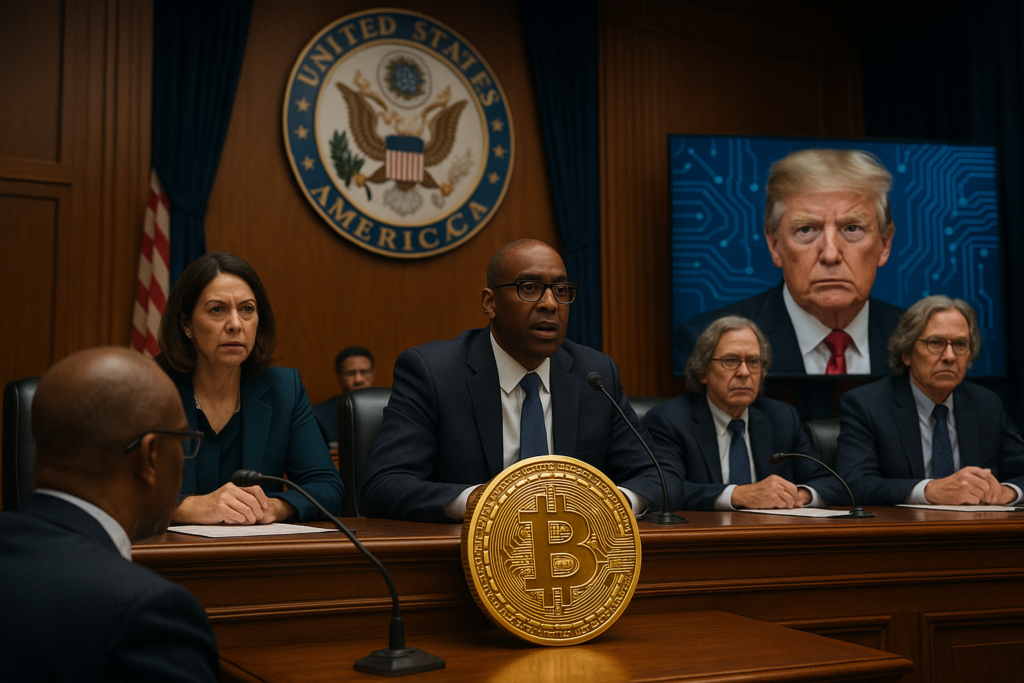A rare follow-up hearing in the House Financial Services Committee reignited debate around the Clarity Act, a Republican-led crypto market structure bill, and President Donald Trump’s crypto ventures, which Democrats claim present ethical concerns.
Democrats Demand Clarity on Trump’s Ties to Crypto
On Friday, Democrats pushed for a “minority day” hearing focused on the Digital Asset Market Clarity Act. Spearheaded by Ranking Member Maxine Waters, the session featured witnesses selected by Democrats and was driven by concerns over Trump’s potential conflicts of interest in the digital assets space.
“What I’m opposed to in this act… is the crooked president… using the office to enhance his access to profits,” Waters stated, highlighting Trump’s alleged involvement in crypto-related fundraising and influence peddling.
The act has already drawn partisan lines, with Republicans arguing it fills a regulatory gap, while Democrats caution it may enable loopholes and reduce SEC oversight.
Republicans Defend Need for Framework
Committee Chair French Hill countered that the current system lacks any clear federal rules for non-security digital assets. Fellow Republicans Bryan Steil and Warren Davidson echoed support for the bill, citing regulatory uncertainty as a driver of consumer risk.
“There is no federal framework for non-security digital assets,” Hill said. “This bill attempts to fix that vacuum.”
Split Opinions Within the Democratic Party
Despite top Democrats’ criticism, younger and centrist members have shown support for advancing crypto legislation. Rep. Jim Himes (D-CT), who voted yes on FIT21 (a precursor to the Clarity Act), voiced support but raised concerns about regulatory loopholes, especially those that could let firms bypass SEC jurisdiction.
“There may be provisions that carve out regulatory oversight in ways that weaken consumer protection,” Himes warned.
Critics Highlight Cybersecurity and Enforcement Gaps
Carole House, a former White House adviser, criticized the bill for overlooking cybersecurity risks, citing recent breaches like the ByBit exchange hack. Meanwhile, Amanda Fischer of Better Markets criticized CFTC oversight as weaker than SEC regulation, warning that companies could exploit dual-agency structures to evade full transparency.
“The CFTC exception could be exploited by bad actors,” Fischer warned.
Trump’s Memecoin and SEC Interference Claims Resurface
Bart Naylor of Public Citizen accused Trump of soliciting favors and gifts via crypto, pointing to actions like memecoin-linked dinners and intervening in SEC cases involving crypto donors.
“Trump is selling favors,” Naylor said, reviving concerns about corruption through digital asset fundraising.
White House officials have denied any conflict of interest, stating Trump’s crypto activities are separate from his official duties.
Conclusion
The Clarity Act continues to highlight both bipartisan desire for crypto regulation and deep divisions over enforcement, oversight, and ethics. With a markup vote expected next week, the future of U.S. crypto market regulation remains contentious, especially as Trump’s personal ties to digital assets dominate headlines.
